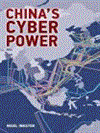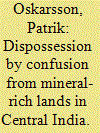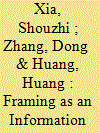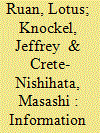| Srl | Item |
| 1 |
ID:
145002


|
|
|
|
|
| Publication |
London, IISS, 2016.
|
| Description |
155p.pbk
|
| Series |
Adelphi Series; no. 456
|
| Standard Number |
9781138211162
|
|
|
|
|
|
|
|
|
|
|
|
Copies: C:2/I:0,R:0,Q:0
Circulation
| Accession# | Call# | Current Location | Status | Policy | Location |
| 058653 | 303.48830951/INK 058653 | Main | On Shelf | General | |
| 058755 | 303.48830951/INK 058755 | Main | On Shelf | General | |
|
|
|
|
| 2 |
ID:
121111


|
|
|
|
|
| Publication |
2013.
|
| Summary/Abstract |
Bauxite mineral projects in central India have in recent years generated conflicts over both the physical environment and equitable development for very vulnerable people. In one such project, a joint venture between the state government of Andhra Pradesh and a private investor, attempts are currently being made to open up land constitutionally reserved for India's Scheduled Tribes. The final outcome, though still uncertain, depends not only on the relative material resources of the opposing parties, but on a drawn-out process of contestation where the discursive resistance to tribal land dispossession has strong historical roots and many active supporters. Thus, for the project's promoters, their advantage rests on their ability to create confusion via superior access to, and control over, information, rather than relying on their direct authority.
|
|
|
|
|
|
|
|
|
|
|
|
|
|
|
|
| 3 |
ID:
186565


|
|
|
|
|
| Summary/Abstract |
How can authoritarian regimes effectively control information to maintain regime legitimacy in times of crisis? We argue that media framing constitutes a subtle and sophisticated information control strategy in authoritarian regimes and plays a critical role in steering public opinion and cultivating an image of competent government during a tremendous crisis. Using structural topic models (STM), we conduct a textual analysis of more than 4,600 news reports produced by seven Chinese media outlets during the COVID-19 pandemic. We find that Chinese media, instructed by the propaganda authorities, used a heroism frame to feature frontline medics’ sacrifices when saving others in need and resorted to a contrast frame to highlight the poor performance of the United States in the fight against COVID-19. We also show that both state and commercial media outlets used these two frames, though the tone of commercial media coverage was generally more moderate than the state media version.
|
|
|
|
|
|
|
|
|
|
|
|
|
|
|
|
| 4 |
ID:
179772


|
|
|
|
|
| Summary/Abstract |
When does repression of online expression lead to public punishment of citizens in China? Chinese social media is heavily censored through a system of intermediary liability in which the government relies on private companies to implement content controls. Outside of this system the Chinese authorities at times utilize public punishment to repress social media users. Under China’s regulatory environment, individuals are subject to punishment such as fines and detention for their expressions online. While censorship has become more implicit, authorities have periodically announced cases of repression to the public. To understand when the state escalates from censoring online content to punishing social media users for their online expressions and publicizes the punishment, we collected 468 cases of state repression announced by the authorities between 1 January 2014 and 1 April 2019. We find that the Chinese authorities most frequently publicize persecutions of citizens who posted online expression deemed critical of the government or those that challenged government credibility. These cases show more evidence of the state pushing the responsibility of ‘self-regulation’ further to average citizens. By making an example of individuals who post prohibited content even in semi-public social media venues, the state signals strength and its determination to maintain authority.
|
|
|
|
|
|
|
|
|
|
|
|
|
|
|
|